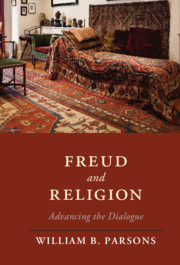Book contents
- Freud and Religion
- Cambridge Studies in Religion, Philosophy, and Society
- Freud and Religion
- Copyright page
- Contents
- Introduction
- 1 Why Freud Wrote on Religion
- 2 Totem and Taboo
- 3 Freud’s Moses
- 4 Future of an Illusion
- 5 Civilization and Its Discontents
- 6 Freud and Eastern Religions
- 7 Psychoanalysis and Religion beyond Freud
- 8 Revisions and Applications
- Conclusion
- Bibliography
- Index
6 - Freud and Eastern Religions
Published online by Cambridge University Press: 07 May 2021
- Freud and Religion
- Cambridge Studies in Religion, Philosophy, and Society
- Freud and Religion
- Copyright page
- Contents
- Introduction
- 1 Why Freud Wrote on Religion
- 2 Totem and Taboo
- 3 Freud’s Moses
- 4 Future of an Illusion
- 5 Civilization and Its Discontents
- 6 Freud and Eastern Religions
- 7 Psychoanalysis and Religion beyond Freud
- 8 Revisions and Applications
- Conclusion
- Bibliography
- Index
Summary
It is common fare to think that Freud reflected mainly on Judaism and Christianity, leaving Eastern religions in the lurch. Part of this is attributable to the fact that in Freud’s era relatively little was known of Buddhism and Hinduism. Before 1880, which is to say, the beginning of the psychology and religion movement, the engagement with Eastern religions in Europe and North America was sporadic and piecemeal, informed primarily through the auspices of missionaries, business enterprises, travel, and trade. By the time the psychology of religion was establishing itself as an intellectual discipline, the gradual dissemination of Eastern religions in the West was only just beginning. With respect to academia, chairs in Oriental studies and comparative religion at Ivy League schools and European institutions (including the University of Vienna where Freud studied and taught) were newly minted, giving rise to an initial generation of scholars (e.g., Rudolph Otto, Friedrich Heiler, Max Müller) and the introduction of the first accessible translations (notably, the classic Sacred Books of the East series). On the wider cultural scale, Eastern religious ideas were beginning to be disseminated through the auspices of philosophers and poets (e.g., Nietzsche, Emerson, the Theosophical movement) and visits from Eastern holy men (e.g., Vivekananda, Yogananda), the latter initiated by the World’s Parliament of Religions in Chicago (1893). In the United States one finds for the first time the establishment of institutions for meditative techniques aided by a social base of Asian immigrants (approximately one million strong). The exemplars of Hinduism and Buddhism, as well as their Western sympathizers, were eager to frame Eastern religions as commensurate with the scientific enterprise.
- Type
- Chapter
- Information
- Freud and ReligionAdvancing the Dialogue, pp. 151 - 187Publisher: Cambridge University PressPrint publication year: 2021



